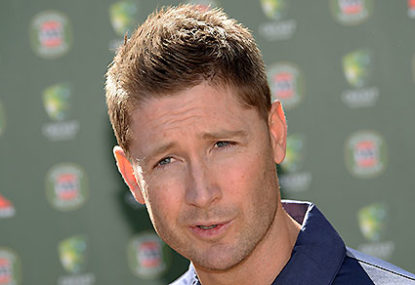The news could not have been any bleaker for Australia upon its arrival in England with the fact that skipper Michael Clarke has again had a flare up of his back complaint.
After nursing his way to 92 consecutive Tests by carefully managing a condition he has had since his late-teens, he was finally forced to miss a Test match – the final match of the most recent series against India at Delhi.
The news that he was unable to play in the two warm-up matches against India and West Indies ahead of the Champions Trophy will have sent a massive scare through the Australian camp, no matter how positive they try to spin the situation to the public.
As I mentioned in a column on The Roar on 24 March, Clarke’s injury has always been described as being ‘degenerative’ with respect to the disc problem he has suffered in his lower back.
By its very nature, a degenerative illness or injury means that the complaint in question will continue to worsen over time.
That being the case, the million-dollar question is just how many more matches will Clarke miss as a result of his ongoing problem?
His absence from the final Test of the Indian tour in March resulted in Shane Watson going from a suspended player one week to the country’s captain the next.
It was a situation that was met with considerable mirth and derision by many cricket fans.
Ahead of the selection of the Ashes squad Watson announced that he no longer wished to be vice-captain in any of the three forms of international cricket.
In essence, given what transpired in India, it was a case of falling on his own sword rather than being sent to the guillotine.
Wicket-keeper Brad Haddin, himself an exile at Test level for well over a year, returned to the Australian team in one-off capacity for the third Test against India in Mohali as a result of an injury to the incumbent, Matthew Wade.
Wade returned to for the final Test and Haddin to the sidelines.
However, when the Ashes squad was announced Haddin was a major beneficiary, it only selected for the tour but going in the role of vice-captain.
It will fall on his ageing shoulders to lead the Test side should Clarke be ruled unfit at any time during the forthcoming Ashes series.
If Clarke is unable to take his place as skipper of the Champions Trophy side he will give way to his deputy George Bailey.
From the Test perspective, while Clarke’s captaincy would be missed, it is the potential loss of his batting prowess that would be the most acutely felt.
In the past six months Australia has said farewell to two of its most successful and intuitive batsmen of recent times – Ricky Ponting and Michael Hussey.
Ponting was always going to be an iffy prospect for this Ashes series but nonetheless his absence, coming as close as it did to cricket’s most high profile series, lessened the chances of the selectors developing a replacement.
Hussey, on the other hand, was a gilt-edged certainty to be on the plane to the Old Dart had he not taken everyone by surprise at the end of the summer by announcing his retirement.
He drew the curtain on a fabled career on the back of three Test centuries during the summer.
With the loss of both Ponting and Hussey, Australia was immediately faced with a crisis in respect to battle-hardened Test batsmen – a commodity that every Test team requires.
There is no doubting that the retirement of Ponting and Hussey predicated the selection of Chris Rogers, at 35, in the squad as much as the unstable and uncertain record of the current top-order.
Having selected him at that age it is almost certain that he will open the batting in the opening Test at Nottingham on 10 July.
While raw at Test level – his only appearance is as a stand-in for an injured Matthew Hayden at the WACA against India in January 2008 – he has a wealth of experience at first-class level, and importantly, a lot of it in England.
He has plundered bowling attacks at county level over the last five years, scoring over 5000 first-class runs.
Already this northern summer playing for Middlesex in the County Championship he is averaging 66 and scored 214 in an innings against Surrey at Lord’s.
But it is Clarke that is the key piece in Australia’s batting jigsaw.
He is the reigning Wisden International Cricketer of the Year on the back of a record four Test double centuries in the one calendar year and an average of 106.
He boasts a career average of 52.3.
He is Australia’s most valuable player by a considerable margin.
Australia will start this Ashes series as very much the underdog.
For them to buck the trend set by the pundits and the bookies everything would have to fall perfectly into place for the tourists and England would need to be off its game.
Should Clarke’s back complaint see him miss any matches the prospects of an Australian upset would be greatly diminished.
His future at international level will likely be interrupted again in the future by his ailment.
All Australian fans have to hope that his absence doesn’t coincide with a marquee series where he is crucially required in the middle.





























































































